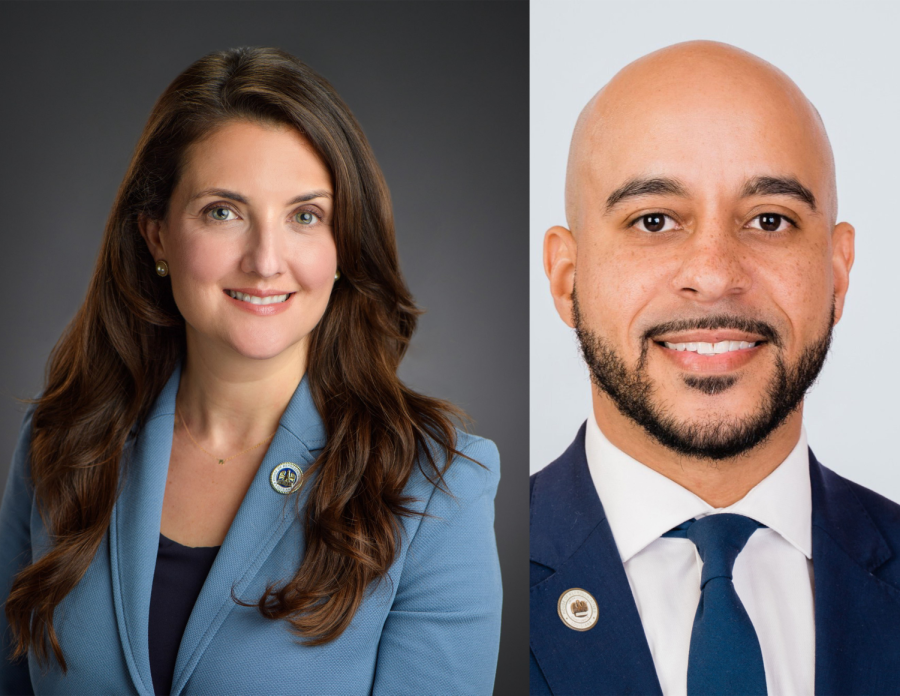State representatives race for representation
October 25, 2022
Representatives Royce Duplessis and Mandie Landry will appear on the ballot in coming weeks to fill the district 5 state Senate seat vacated by Karen Carter Peterson. District 5 encompasses much of Central City, Broadmoor, the Warehouse District, Treme and part of Uptown, which includes Loyola, Xavier, and Tulane University campuses.
Both Duplessis and Landry are running as Democrats to win the seat in the district, one of the few consistently blue districts in the state of Louisiana, which has a strong Republican majority in the legislature. The candidates have similar views on the most critical issues affecting voters and almost identical voting records in the state legislature. Both candidates were quick to counter these similarities with the ways in which they are set apart, namely in their experience and leadership styles.
Peterson’s resignation, which cited depression and a gambling addiction as the causes, had left the seat vacant since April this year. Peterson plead guilty to one count of wire fraud just four months after her resignation, in what the Justice Department referred to as a seven year scheme to defraud donors.
Duplessis currently serves as Louisiana State Representative for District 93, and Landry serves as Louisiana State Representative for District 91.
The candidates debated on WDSU Oct. 17 and highlighted reproductive rights and equal representation as major issues focused on in this race.
Equal Representation
Duplessis emphasized how he has always stressed equal representation.
“My campaign is really not about me, it’s about the people,” Duplessis told The Maroon. “My campaign represents everyone.”
During Monday night’s televised debate on WDSU, Duplessis said that, along with encouragement from community members, is what pushed him to run.
“The Legislative Black Caucus for which I am a proud member of, said we have fought hard for equal representation, and you have been an effective leader, and we need you to run for this seat,” Duplessis said.
As of this year, 23% of the state Senate is Black and 12.8% are women, while the 2020 Census data indicates the state is 33.1% Black and gender distribution being roughly 50% women.
Landry said in her opening statement during the debate that District 91, which she represents, is incredibly diverse.
“When I was elected in 2019, the district was and is majority female and majority African-American voters,” she said. “I knocked on doors. I met people. They trusted me. They liked me. They voted for me. They believed in me.”
Landry’s campaign website said that growing up in a working-class family and being the first in her family to graduate from college has helped her uniquely understand and fix the district’s issues.
“A lot of the reason I ran in the first place is because we need more everyday people running,” Landry told The Maroon. “I think the city and the state are not going to change if we keep electing politicians.”
The state underwent a redistricting this year which sought to accurately divide political districts for state house and senate seats in response to demographic changes. Despite Black people making up more than one third of the State’s population, the Republican state legislature voted to limit Black representation to a single Black majority district.
Duplessis said he fought alongside his fellow members of the Black caucus to increase the number of majority Black resident districts in an attempt to create more equal representation.
“It certainly favored incumbency,” Duplessis said in a press club meeting following the redistricting. “We have one third of the population African-American in this state, but two-thirds of the prison population is African-American. We can get into a whole other conversation about that, but I think it is all connected.”
Women’s Health
Landry said the issue of women’s health and reproductive rights are of crucial importance.
Louisiana has some of the most stringent laws regarding abortion access and high maternal mortality rates in the country, according to the Louisiana Department of Health.
Pregnancy-related deaths also unequally affect women across racial lines. According to the health department’s maternal-mortality review for 2017 to 2019, Black women are over two times more likely in Louisiana to die in a pregnancy related death than white women.
Landry’s campaign website said that during her career as an attorney, she has represented one of the state’s last three abortion clinics, an In-Vitro Fertilization Clinic, and people seeking abortions. Louisiana has never elected a person who has represented an abortion clinic to state office, and according to her website, Landry is the only pro-choice woman in state legislature.
Duplessis told The Maroon that reproductive rights are something he cares about personally.
His campaign website features a video of his mother, Hedy Duplessis, retelling the story of how her grandmother almost died during a self-induced coathanger abortion.
Duplessis said in the video, “what happened to my great-grandmother will continue to happen until the rights of women are restored.”
He also worked to establish the Louisiana Maternal Mental Health Task Force which seeks to advance education, treatment, and services relating to maternal mental health.
Landry worked for over a year to expand Medicaid for new mothers from 60 days to one year postpartum with her 2021 legislation, according to her campaign website. This piece of legislation made Louisiana the first state in the country to enact this new policy, she said.
Styles of Leadership
Landry and Duplessis characterize their leadership styles differently, which may be a pivotal factor for voters deciding between the two New Orleans Democrats.
Landry told The Maroon she is okay with making the hard vote.
“Starting a conversation is the point,” Landry told The Maroon. “Our styles are very different, I stick my neck out for people.”
She said in the debate on WDSU that she has been successful working across the aisle.
“You have to pick and choose your battles, and you have to know when to compromise,” she said during the debate.
Duplessis said he emphasizes working with both sides as a “coalition builder.”
During the debate on WDSU, Duplessis said, “if you can’t work well with Republicans, it’s really hard to get anything passed with the state legislature.”
A Message to Young Voters
Landry told The Maroon that voting is more important than ever.
“I have a ton of college students on my staff,” she said. “I wish we had more young people, not even just running for office, but getting involved in campaigns.”
Landry said young people want progressive leaders who represent them. Landry said she worked almost entirely with high school students for her bill that sought to ban conversion therapy in Louisiana, the first of its kind in the state.
Duplessis urged young voters to get informed and get engaged.
“People of color are under-represented,” Duplessis said. “Young people need to fight for the representation they deserve.”








